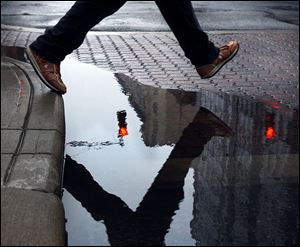
Make wine sales easier
12/11/2004
A pedestrian hops a puddle at the corner of North Huron Street and Madison Avenue. That puddle of water should turn into a sheet of ice tonight as the temperature dips into the 20s.
THE U.S. Supreme Court would do wine lovers in Michigan, Ohio, and around the country a favor by corking anti-consumer laws in 24 states that prohibit direct sales by out-of-state wineries via telephone and the Internet.
The high court, which heard arguments this week, must fashion a decision from conflicting appeals court rulings. One, from New York, upheld state restrictions that allow wine sales only through licensed wholesalers. The other, from Michigan via the Sixth Circuit Court of Appeals in Cincinnati, says such restrictions are unconstitutional.
It makes little sense that, under current law, a Toledoan who, for example, enjoyed a crisp riesling at a winery while on vacation in Washington state, may not have a few bottles shipped home. Likewise, once back in Ohio, the consumer may not get on the Internet to order wine from Washington - or any other state. That's because both Ohio and neighboring Michigan have the restrictive laws.
Such laws would seem to discriminate against one set of businesses at the expense of another and work against competition, as well as consumer selection. There seems to be little downside to allowing a wider reach to the nation's 3,700 wineries, a $21.6 billion-a-year business sector that has quadrupled since 1980.
We recognize that the states have an obligation under the 21st Amendment to collect sales taxes and to help ensure that alcoholic beverages do not fall more easily into the hands of minors.
But there are ways to solve those problems while allowing consumers greater choice and businesses more profit.
States could, as one Supreme Court justice suggested, simply require licenses for out-of-state wineries that would require collection and remittance of sales tax. And sellers could require deliveries to be signed for by adults only.
One law enforcement group opposed to relaxing the laws suggests that Internet sales would give minors access to alcohol as easily as "point, click, and drink," but it's not that simple, Realistically, few minors would go to the trouble of ordering wine from far away when - unfortunate but true - they can get it quicker locally using a fake identification.
What's being decided is a matter of convenience and choice for adults, and we'll raise a glass of the finest vintage if the Supreme Court rules that way.